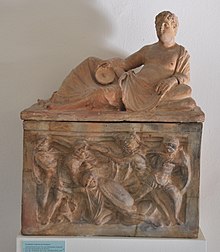
The Thebaid or Thebais ( Greek: Θηβαΐς, Thēbais), also called the Cyclic Thebaid, is an Ancient Greek epic poem of uncertain authorship (see Cyclic poets) sometimes attributed by early writers to Homer, for example, by the poet Callinus and the historian Herodotus. [1] It told the story of the war between the brothers Eteocles and Polynices, and was regarded as forming part of a Theban Cycle. Only fragments of the text survive.
See also
Select editions and translations
Critical editions
- Kinkel, G. (1877),
Epicorum Graecorum fragmenta, vol. 1, Leipzig
{{ citation}}: CS1 maint: location missing publisher ( link). - Allen, T.W. (1912), Homeri opera. Tomus V: Hymni, Cyclus, Fragmenta, Margites, Batrachomyomachia, Vitae, Oxford,
ISBN
0-19-814534-9
{{ citation}}: CS1 maint: location missing publisher ( link). - Bernabé, A. (1988), Poetae epici Graecae, vol. pars i, Leipzig,
ISBN
978-3-598-71706-2
{{ citation}}: CS1 maint: location missing publisher ( link). - Davies, M. (1988), Epicorum Graecorum fragmenta, Göttingen,
ISBN
978-3-525-25747-0
{{ citation}}: CS1 maint: location missing publisher ( link).
Translations
- Evelyn-White, H.G. (1936),
Hesiod, the Homeric Hymns, and Homerica,
Loeb Classical Library (3rd rev. ed.), Cambridge, Massachusetts,
ISBN
978-0-674-99063-0
{{ citation}}: CS1 maint: location missing publisher ( link). (The link is to the 1st edition of 1914.) English translation with facing Greek text; now obsolete except for its translations of the ancient quotations. - West, M.L. (2003),
Greek Epic Fragments, Loeb Classical Library, Cambridge, Massachusetts,
ISBN
978-0-674-99605-2
{{ citation}}: CS1 maint: location missing publisher ( link). Greek text with facing English translation
Bibliography
- Davies, M. (1989), Greek Epic Cycle, London,
ISBN
978-1853990397
{{ citation}}: CS1 maint: location missing publisher ( link).
References
- ^ West, M.L. (2003). Greek Epic Fragments. Vol. 497. Cambridge, Mass.: Harvard University Press. p. 8. ISBN 0-674-99605-4. OCLC 50503243.
